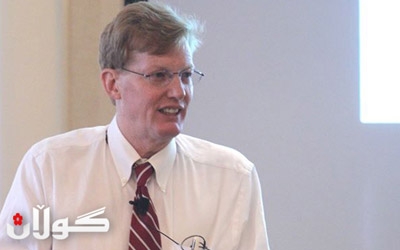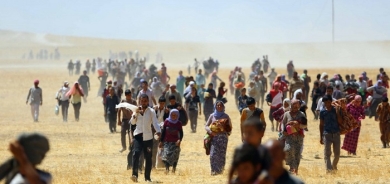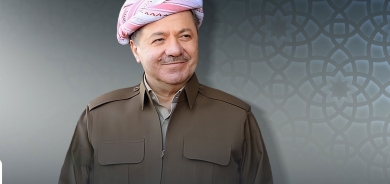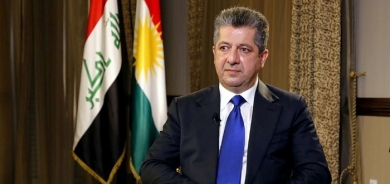Joshua Landis: the Kurds have a duty to provide a more liberal form of nationalism
December 17, 2014
Exclusive Interviews

Landis: the last time sides in Syria talked together was in Geneva conference where all eyes were focused on trying to get rid of Assad and to promote the rebels. Today the Arab Spring is no longer the focus of the international community what it comes to matters in the Middle East. Today is the suppression of terrorism and particularly the growth of ISIS which seems to have now new groups in Yemen, in Libya, and in the Sinai and joining this new more capable Al-Qaeda project, and that is a bad news for many liberals in the Middle East.
Gulan: so the priority of the United States foreign policy now is focused on defeating ISIS rather than Arab Spring…
Landis: Yes whether on promoting democracy… On the other hand it is good for the Kurds… it could be good for the Kurds. The US is looking for partners who will attack and help them contain ISIS, and the Kurds, of course, are well placed. There is a problem now for the Kurds of Kobane and Afrin, for the Kurds of northern Iraq and north and western Syria, it is very clear, they are well positioned to help, but for the Kurds of Afrin who are sitting in a very dangerous position, they have the worry… I would say that for the Kurds of Afrin, it is a very dangerous moment however, because ISIS has found a weaker one in the international community’s willingness to attack them and that is these Kurdish enclaves off in Kobane and possibly in Afrin because Turkey sits in a very complicated position, because in some ways ISIS is a strategic partner for Turkey just as the Assad regime is the strategic partner for the United States. Now both Turkey and America are denying that passionately because they do not want to be linked to these.
Gulan: So you expect Afrin to be as Kobane?
Landis: Because many people look at Afrin now as being a Kurdish enclave far away from Kurdistan, from the center of Kurdistan, which is very vulnerable, and if the IS decide to attack Afrin, who will help them? Will the Turks help them? Or will they allow them to be smashed because of PYD. This is what happened in Kobane, now caused the Americans came to the aid of the Kurds in Kobane, but Turkey was very reluctant to do so and it only did so when it became clear that the PYD was hanging on, the PYD fighter would not be destroyed and then America has taken a very clear position.
Gulan: Mr. John Kerry has mentioned that this war is going to last for some more years, and recently there has been a kind of agreement between KRG and the central government in Baghdad about oil revenues. So do you think this agreement will unite Iraqis against ISIS, and do you think the United Nations and United States’ influence were successful in putting Iraq’s different components together to fight ISIS terrorism, and how are the international coalitions going to force Abadi to resolve the problems with KRG?
Landis: So long as ISIS is such a threat to both Kurdistan and Baghdad, the Kurds and the Arabs will find a way to agree. But of course the moment that Baghdad beats ISIS and ISIS is weak, there is going to be many difficulties because of the big region between Arabs and Kurds, where both Arabs and Kurds are living together and where there is no clear border, and today the Kurds are taking many regions which the Arabs claim for themselves, and this is about to create conflicts in the future. Here the United States held a conference and there people arguing that the United States should not arm the Kurds so much because they are taking lands that the US has previously said that belongs to the Arabs, and this opens the question, of course, of who owns which land in Iraq and this question is going to be the one that cause the Arabs and the Kurds to differ for many decades in the future.
Gulan: we see that the regional equation is going to change. Until the rise of Arab Spring, the west and the United States were allies with the Sunni Arabic countries, but following the winning of Muslim Brotherhood in Egypt and Islamic parties in Libya, and the rise of ISIS, we see that the Sunni Islamic countries do not get along with the west in terms of anti-terrorism strategy…
Landis: but the Sunni countries are so delighted, and you see divisions between Saudi Arabia and Turkey for example. Turkey is supporting the Muslim Brotherhood. Saudi Arabia sees Muslim brotherhood as deadly enemy, and this way most recently in Syria you have information about Revolutionary Command Council, seventeen opposition militias leaguing in Turkey to try to form some common command, many of them Islamists. Saudi Arabia and the southern regions around Darea have taken no participation in this. So we have seen even this division between the Muslim Brother supporting Sunnis and the anti-muslim brother Sunnis now dividing Syria between north and south, where the Saudi influence in the south is quite different and then promoting different groups than the Turkish influence in the north. So it is very difficult to focus on Sunni world, of course there is a Sunni world which are against the Shiites and against Iran and against Baghdad and against Damascus, but they don’t agree…
Gulan: what about Qatar? Is it in the same position of Turkey?
Landis: absolutely, in the same position of Turkey. I mean this division even divided the Gulf, and this is a great weakness.
Gulan: so do you expect a kind of shift in the western alliance from the Sunni worlds to the Shiite world?
Landis: I don’t think it will be a shift in a sense that they will abandon the Sunnis and make a love with Shiites, no. But I do see that the United States has its moves out in the Middle East to some dgree, or it takes a lesser role in these Middle Eastern power struggles. It is going to begin to balance between Iran and Saudi Arabia, so it is time to move away from its traditional role as the enemy of Iran and friend of Saudi Arabia to taking a more balanced position, working with Iran on something, and working with Saudi Arabia with others and reassuring both sides…
Gulan: in his letter to Iranian president, Obama emphasizes that the anti-Islamic state coalition strategy is not going to include toppling Assad from power. So is that to be considered as a kind of alliance with the Shiites?
Landis: I think people are going too far. I think many people in Syria, particularly among the opposition, when they see that the America is not joining them and sharing their saying, they think that the America has a secret alliance with Assad, and this is far from the truth. America clearly has common enemy in ISIS, but American historical position towards Assad was very inimical. All the Sunni powers want America to destroy Assad and destroy the regime in Damascus, and America doesn’t want to do this because America learned hard way that if it destroys these dictatorships instate, it gets chaos, it doesn’t get a better regime, and this is what we discovered, of course, in Iraq, in Libya, and in Yemen.
Gulan: the Kurdish people are also Sunnis, but they are the only Sunnis fighting ISIS. To what extent is it important for the international coalition to support Kurds and Peshmerga forces in this regard?
Landis: this puts the Peshmerga and Iraqi Kurdistan in a very strong position. Not only does it help it in negotiations in Baghdad, but it helps in negotiations with Turkey and the United States. Of course, the Peshmerga have to be very careful because Turkey is going to try to put the Peshmerga… it is going to try to divide the Kurds and use the Peshmerga in a sense to fight against the PYD. Now this offers a big opportunity for the Peshmerga, which is to try to act as a diplomat in improving relations between the PYD and the Kurds more generally in Turkey, and to try to promote Kurdish interest in Turkey as the broker between PYD and Ankara. But it also opens up many dangerous to the Peshmerga because if the Peshmerga allow themselves to think very locally and only promote the interest of Barzani, then they will be used by Turkey to hurt PYD, and this will diminish the good name of the Peshmerga in the eyes of many Kurds, and it will make the Kurds fall victim to the kind of fragmentation and disintegration that has always weakened them in the face of stronger neighbors. This is a great opportunity for the Kurds because the world and international community need the Kurds, they need partners, and they didn’t find any partners amongst the Sunni Arabs, but find partners only reluctant partners, hesitant partners, whereas the Kurds are much more able and easy partner. The problem with the Kurds, from the American point of view, is that the Kurds don’t want to conquer Arab lands; they don’t want to rule over areas that belong traditionally to Arabs; if there is mixture of Arabs and the Kurds yes the Kurds want to rule them, but if there is no Kurds, then it will be very difficult to use the Kurdish forces because they don’t want to fight their neighbors, the Arabs. They need ultimately (the Kurds) much more good relations with their neighbors with the Sunni Arabs, and so they don’t want to become just simply an instrument of American power in the region. They have to be cautious.
Gulan: Turkey and Saudi Arabia don’t deal with Jabhat Al-Nusra which is a branch of Al-Qaeda terrorist organization as a terrorist organization; they consider them as a Syrian opposition and help them. So how is it possible to right ISIS and draw a strategy for defeating them, while Al-Qaeda is strengthened by these countries?
Landis: I don’t think that the United States can defeat ISIS, and I believe that many people in Washington agree with that, they can degrade and they can contain; only local Arabs can defeat ISIS. As long as the Sunni population in this big area between Baghdad and Aleppo look at the ISIS as champions of their rights, America will not be able to defeat them.
Gulan: what about the political solution to defeat ISIS?
Landis: America does not have a political solution for defeating ISIS. That is something that I think America has given up. After spending so much money in Iraq, America is not prepared and doesn’t try to find out a solution to fix Syria; it is only prepared to fight a war of counter terrorism, and I think Obama will measure his success by whether numbers of ISIS or Al-Qaeda killed more Americans…
Gulan: you mean ISIS cannot be defeated by military means or the United States is incapable of doing that and doesn’t want to repeat the mistakes did in Iraq?
Landis: I think both of these things are right. America cannot do this by military means but it needs a political solution where Sunni Arabs gain a better regime and secondly America no longer believes that can fix broken nations in the Arab world; it is not going to try to fix Syria; therefore, president Obama is going to settle for the much smaller ambition which is to weaken both Nusra and ISIS so that they cannot carry out terrorist operations in the west. That is the common goal of all international powers, and this is why it is very upsetting for many Sunni Arabs and Arabs in general because they realize that the west is abandoning them, that the west is no longer look at their interests, the west is simply look at the western interests, and they will allow ISIS and other militias to terrorize Syria even as they try to keep ISIS and Al-Nusra stop terrorizing westerners and this underlines the fact the terrible reality of nation states is that people are selfish and they care about themselves, and they don’t know to care about their neighbors.
Gulan: do you expect any kind of border change as a result of these conflicts in the Middle East?
Landis: I think we are seeing the emergence of a Kurdish nation, and that will be a big border change. I do not believe that we are going to see a border change between Syria and Iraq at least no officially. Of course we are going to see a border change in a sense there is no longer a real border between Iraq and Syria, but I don’t expect that the international community will accept such changes in borders. Will Syria be ruled by the central government again or by one sovereign government? I cannot answer this question; I think it is going to be in many years that Syria will be divided internally for many years to come, and that is at least for ten more years Syria is going to have militias with broad blocks and the local security arrangements.
Gulan: any message to our readers?
Landis: the Kurds have been very successful in presenting themselves as moderate Muslims, as presenting themselves as protectors of many different minority groups, and giving women more equality than other groups, and for all these reasons the western world is seen in the Kurds a great partner to support and this has, of course, been very important for Kurds, the western opinion, because during the decades in which countries wanted to accede to the European Union, the pressure on Turkey to recognize Kurds and Kurdish rights and to stop the worst aspects of discrimination against the Kurds, one of the very important to the emergence of Kurdish rights in Turkey and ultimately in Iraqi Kurdistan, and this will continue to play a role in getting rights for the Kurds both in Iraq and in Syria and in turkey. So this charm campaign that the Kurds have been waging has been successful and important. It is more than just propaganda actually consolidating the protections of minorities and not allowing Kurdistan become a narrowly focused ethnically but actually propagate true liberalism; it is important to the entire region because the region and particularly Arab Nationalism and Turkish nationalism have suffered from racism of narrow nationalism, of xenophobia nationalism, and the Kurds have been suffered from this the most because the Turks tried to determine for the Turks and the Arabs tried to determine for the Arabs, and they kept under the heel of military boot, so it will be a great shame if the Kurds do this to other people. So in away the Kurds have a duty to provide a more liberal form of nationalism.















